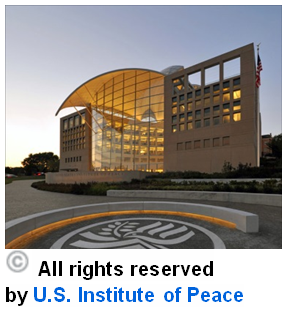I am Andy Blum, Vice President for Program Management and Evaluation at the U.S. Institute of Peace (USIP), an independent organization that helps communities around the world, prevent, manage or recover from violent conflict. I recently spoke at a brown bag for the Washington Evaluators about the process of improving my organization’s learning and evaluation processes in general, and creating an organizational evaluation policy in particular. In this post, I’ll provide a few of the takeaways that could be applicable in other contexts.
 Here are three, hopefully generalizable, lessons from the process of crafting the evaluation policy at USIP.
Here are three, hopefully generalizable, lessons from the process of crafting the evaluation policy at USIP.
Lesson Learned: Conducting a baseline assessment was extremely helpful. By asking staff their greatest hopes and fears of evaluation, themes emerged, and the findings proved useful as an assessment of where we stood regarding learning and evaluation, and for developing an action plan to improve evaluation.
Lesson Learned: When talking about changing how evaluations are done and used in organizations, you need to manage messaging and communications almost fanatically. The phrase “demystify evaluation” had real resonance. I found myself becoming almost folksy when discussing evaluation. Instead of saying theory of change, I asked, “Why do you think this is going to work?” Instead of saying indicator or metric, I would ask, “What are you watching to see if the program is going well?” Especially at the beginning of an effort to improve evaluation, you do not want to alienate staff through the use of technical language.
Lesson Learned: There is a tension between supporting your evaluation champions and creating organizational “standards.” Your evaluation champions have likely have created effective boutique solutions to their evaluation challenges. These can be undermined as you try to standardize processes throughout the organization. To the extent possible, standardization should build on existing solutions.
Rad Resource: The best change management book I’ve seen: Switch: How to Change Thing When Change is Hard, by Chip Heath and Dan Heath.
Hot Tips—Insider’s advice for Evaluation 2013 in DC: The Passenger is DC’s most famous cocktail spot, but if the weather is good you can’t beat Room 11 in Columbia Heights as a place to sit outside and drink real cocktails.
We’re thinking forward to October and the Evaluation 2013 annual conference all this week with our colleagues in the Local Arrangements Working Group (LAWG). Registration is now open! Do you have questions, concerns, kudos, or content to extend this aea365 contribution? Please add them in the comments section for this post on the aea365 webpage so that we may enrich our community of practice.

Nice post … and I absolutely agree about the Heath book. One of my favorite reads. Has helped me with more than one project. dhs